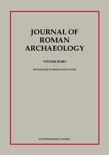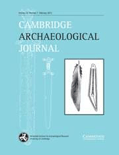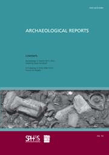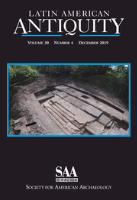
Journal of Roman Archaeology
Scope & Guideline
Illuminating Roman Heritage: A Scholarly Journey
Introduction
Aims and Scopes
- Interdisciplinary Approaches to Roman Society:
The journal emphasizes interdisciplinary research that combines archaeology, history, art history, and anthropology to provide a holistic understanding of Roman culture and its complexities. - Material Culture Studies:
A core focus is on the analysis of material culture, including artifacts, architecture, and urban planning, which are essential for understanding the daily lives and practices of ancient Romans. - Cultural Interactions and Exchanges:
The journal often explores themes of cultural interactions, trade, and the diffusion of ideas across the Roman Empire, highlighting how these dynamics shaped local and imperial identities. - Technological Innovations in Archaeology:
It showcases the use of modern technologies such as GIS, remote sensing, and 3D modeling in archaeological research, enhancing the study of Roman landscapes and structures. - Contextual Archaeology:
The journal promotes studies that place archaeological findings within broader historical, social, and environmental contexts, offering insights into the complexities of Roman life.
Trending and Emerging
- Gender and Space in Roman Society:
There is an increasing interest in exploring gender dynamics, particularly how space was utilized and perceived by different genders in Roman domestic and public settings. - Environmental Archaeology:
Studies examining the relationship between ancient Romans and their environment, including climate impact and resource management, have gained traction, reflecting a broader concern with sustainability and ecological history. - Digital Archaeology and Visualization:
The integration of digital tools and methodologies, such as virtual reconstructions and GIS mapping, has become a prominent theme, enhancing the analysis and presentation of archaeological findings. - Social Practices and Everyday Life:
Research focusing on the daily lives of ordinary Romans, including practices related to food, health, and community, is emerging as a significant area of interest, offering insights into the social fabric of Roman society. - Cultural Heritage and Preservation:
There is a growing emphasis on the preservation of archaeological sites and the ethical implications of heritage management, reflecting global concerns regarding cultural heritage in the face of modernization and conflict.
Declining or Waning
- Traditional Epigraphy and Inscriptions:
Research focused solely on inscriptions and epigraphy has been less frequent, as scholars increasingly seek to integrate these studies with broader archaeological and historical contexts. - Roman Military Studies:
While military archaeology remains important, the volume of papers specifically dedicated to traditional military studies has decreased, with a shift towards examining broader social and economic aspects of Roman military life. - Static Historical Narratives:
There has been a move away from purely narrative-based historical accounts of Roman events, favoring analyses that incorporate archaeological data and interdisciplinary perspectives. - Focus on Elite Culture:
Research centered on elite Roman culture and art has waned, giving way to studies that prioritize the experiences and contributions of marginalized groups within Roman society.
Similar Journals

LATOMUS
Unveiling the Rich Tapestry of Human ThoughtLATOMUS is a distinguished academic journal published by Peeters in Belgium, offering a rich platform for scholarly discourse in the fields of Classics, Archaeology, History, Literature, and Linguistics. With the ISSN 0023-8856 and E-ISSN 2294-4427, it has established itself as an essential resource for researchers and professionals seeking to contribute to and engage with critical debates within these disciplines. While not an Open Access journal, LATOMUS is recognized for its robust impact in the academic community, achieving Q2 and Q3 rankings across various categories, including Classics and Archaeology, according to the latest 2023 evaluations. The journal publishes articles that span a range of topics relevant to antiquity and its influences, making it a vital resource for those exploring historical narratives and linguistic developments. As a publication dedicated to advancing scholarly knowledge since its inception in 1971, LATOMUS continues to serve as a cornerstone of academic inquiry within the humanities, promoting intellectual engagement and disseminating high-quality research in its converged years from 1971 to 1974, 1980, and from 2002 to the present.

CAMBRIDGE ARCHAEOLOGICAL JOURNAL
Bridging Cultures, Transforming UnderstandingThe Cambridge Archaeological Journal, published by Cambridge University Press, is a premier academic journal dedicated to archaeology and cultural studies. With an ISSN of 0959-7743 and an E-ISSN of 1474-0540, it has established itself as a leading platform since its inception in 1991, showcasing groundbreaking research that significantly contributes to our understanding of human history and cultural heritage. The journal currently ranks in the top quartile (Q1) across various categories, including Archaeology and Cultural Studies, underlining its impact and relevance in the field. The impact factor reflects its esteemed position, with Scopus ranks placing it within the 90th to 93rd percentiles among its peers. Researchers, professionals, and students alike benefit from its insightful analyses and interdisciplinary approaches, making it an essential resource for advancing knowledge in archaeology and related fields. The journal is based in the United Kingdom, at the Edinburgh Building, Shaftesbury Rd, CB2 8RU, Cambridge, England, and continues to drive scholarly conversations through its commitment to excellence and innovation in archaeological studies.

Archaeological Reports-London
Transforming Discoveries into Scholarly DiscourseArchaeological Reports-London, published by Cambridge University Press, is a prominent journal dedicated to advancing the field of archaeology, encompassing a comprehensive range of studies that delve into the rich tapestry of human history from prehistory to modern times. With an ISSN of 0570-6084 and an E-ISSN of 2041-4102, this journal has been a significant source of scholarly articles since its inception in 1955, serving as a crucial platform for researchers and academics alike. The journal is categorized in the third quartile for Archaeology and Arts and Humanities, and holds a prestigious position in the first quartile for Classics, reflecting its vital role in the scholarly community. With its esteemed ranking of Rank #45/170 in Classics and Rank #210/413 in Archaeology, it provides unparalleled insights and findings that shape contemporary archaeological discourse. Although not an open-access publication, the journal remains key for those who seek to enrich their understanding of archaeological practices and heritage conservation. Engage with Archaeological Reports-London to explore cutting-edge research that illuminates our understanding of past civilizations and informs future directions in the field.

Mediterranean Archaeology & Archaeometry
Connecting Scholars Across Mediterranean NarrativesMediterranean Archaeology & Archaeometry is a premier academic journal dedicated to advancing the fields of archaeology, anthropology, conservation, and history, published by UK Zhende Publishing Ltd. With its ISSN 1108-9628 and E-ISSN 2241-8121, this journal serves as a vital platform for scholars and practitioners to disseminate innovative research and findings related to the rich archaeological heritage of the Mediterranean region. It has gained remarkable recognition, achieving a Q2 ranking in anthropology and archaeology, and a Q1 classification in several categories including arts and humanities, conservation, and history as of 2023. Its impressive Scopus rankings underscore its impact, with a significant position in history (59/1760) and conservation (11/103) disciplines. Spanning years from 2008 to 2022, the journal invites open access contributions to foster collaboration and interdisciplinary dialogue among researchers, students, and professionals alike, making it an indispensable resource for those engaged in the exploration and preservation of historical narratives within the Mediterranean context.

Deltion of the Christian Archaeological Society
Uncovering the Past, Shaping the Future of Christian ArchaeologyDeltion of the Christian Archaeological Society (ISSN: 1105-5758, E-ISSN: 2241-2190), published by the Christian Archaeological Society in Athens, Greece, stands as a pivotal source of scholarly work within the realm of Christian archaeology. This journal is dedicated to disseminating high-quality research that promotes the understanding of Christian history, heritage, and archaeological practices. Though it operates under traditional access options, it provides a comprehensive platform for researchers and professionals alike, fostering dialogue and collaboration within the archaeological community. With a commitment to advancing knowledge, the Deltion aims to support both established scholars and emerging voices, reinforcing the significance of archaeology in interpreting religious narratives and cultural contexts. Researchers, students, and professionals interested in the intersections of archaeology, history, and theology will find this journal an invaluable resource in their scholarly pursuits.

Britannia
Preserving the Past, Inspiring Future GenerationsBrittannia is a prestigious journal published by Cambridge University Press that serves as a cornerstone for scholars and enthusiasts in the fields of Archaeology, Classics, and History. With its ISSN of 0068-113X and E-ISSN of 1753-5352, the journal has been committed to disseminating high-quality research and innovative studies since its inception in 1970, addressing vital topics that span cultural, historical, and archaeological dimensions. As a hallmark of academic rigor, it maintains a Q1 ranking in Classics and History and a Q2 ranking in Archaeology (both Arts and Humanities, 2023), reflecting its impact and significance in these disciplines. Although not an Open Access journal, it provides invaluable content for researchers, professionals, and students alike, ensuring that vital insights into ancient civilizations and cultural heritage resonate well beyond the pages of each issue. With upcoming publications scheduled through 2024, Brittannia continues to be an essential resource for anyone invested in the legacies of the past.

OLBA
Unearthing Insights into Ancient CivilizationsOLBA is a distinguished journal in the field of archaeology, published by Mersin University Publications Research Center Cilician Archaeology in Turkey. With an ISSN of 1301-7667, this academic journal has been a platform for scholarly discourse from 2009 to 2014 and again from 2016 to 2019, with a recent volume published in 2022. Although it is currently categorized in the fourth quartile (Q4) for both Arts and Humanities and Social Sciences within archaeology, OLBA continues to contribute significantly to the global archaeology community. It serves as an essential resource for researchers, professionals, and students interested in the diverse aspects of archaeological studies and cultural heritage. Despite not being an open-access journal, OLBA strives to disseminate knowledge effectively, aiding in the exploration of ancient civilizations and the rich tapestry of human history. Its Scopus rankings, placing it in the bottom percentiles, demonstrate the ongoing need for the community to support and engage with the journal to enhance its visibility and impact in the archaeological domain.

Studijne Zvesti Archeologickeho Ustavu Slovenskej Akademie Vied
Unveiling the stories of the past through rigorous research.Studijne Zvesti Archeologickeho Ustavu Slovenskej Akademie Vied is a leading journal in the field of archaeology, published by the SLOVENSKA AKAD VIED, ARCHEOLOGICKY USTAV, based in Nitra, Slovakia. This esteemed journal, with the ISSN 0560-2793, has established itself as a vital resource for scholars and researchers, reflecting significant academic contributions in both the arts and humanities as well as social sciences. With a 2023 Scopus ranking placing it in the second quartile (Q2) for archaeology, it showcases rigorous research and innovative methodologies, essential for advancing archaeological studies. While it is not an Open Access journal, it continues to offer valuable insights into archaeological findings, theoretical frameworks, and interdisciplinary approaches. The journal serves as a bridge, connecting local Slovak archaeology with international discourse, making it an indispensable tool for students, professionals, and academics striving for a deeper understanding of the archaeological heritage of Slovakia and beyond.

Palaeohispanica-Revista sobre Lenguas y Culturas de la Hispania Antigua
Fostering Insight into Iberia's Linguistic and Cultural EvolutionPalaeohispanica-Revista sobre Lenguas y Culturas de la Hispania Antigua is a distinguished academic journal dedicated to the study of ancient Spanish languages and cultures. Published by the INST FERNANDO CATOLICO in Spain, this journal serves as an essential platform for scholars and researchers exploring the rich historical and linguistic heritage of Iberia. With a specific focus on the intersections of archaeology, history, linguistics, and cultural studies, Palaeohispanica has garnered substantial recognition, reflecting its commitment to high-quality research as evidenced by its rankings in prominent Scopus categories, reaching the 80th percentile in History and the 69th in Archaeology. While the journal operates without an Open Access option, it continues to contribute significantly to the academic discourse surrounding ancient Hispania from 2019 to 2023, ensuring that vital research is accessible to a discerning audience. As a Q3 and Q2 ranked publication in various relevant categories, it is an invaluable resource for professionals, researchers, and students eager to delve into the complexities of ancient languages and cultures.

LATIN AMERICAN ANTIQUITY
Pioneering Research in the Heart of Latin American HistoryLATIN AMERICAN ANTIQUITY is a prestigious journal published by Cambridge University Press, focusing on the archaeology and history of Latin America. With an impressive impact factor reflecting its critical role in the academic community, this journal exemplifies excellence in research, landing in Q1 across multiple categories, including Archaeology and History, as per the 2023 category quartiles. The journal's scope covers a broad range of topics related to pre-Columbian cultures, ancient civilizations, and historical developments, making it essential reading for researchers, professionals, and students keen on exploring the rich tapestry of Latin American heritage. Although it is not an open-access publication, LATIN AMERICAN ANTIQUITY remains a vital resource for those dedicated to advancing knowledge in this dynamic field. With its commitment to scholarly rigor and a strong ranking in Scopus, it serves as a cornerstone for academic dialogue and investigation.